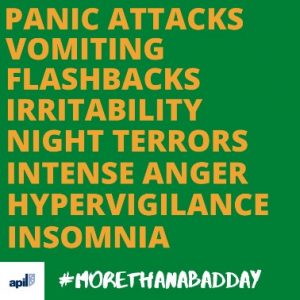
PTSD: An introduction and guide for Military Personnel
- ‘1 in 2 people experience trauma at some point in their life and around 20% of those people go on to develop post-traumatic stress disorder.’ – PSTD UK
This week marks Mental Health Awareness week which is a topic many of our clients can relate to. Post-Traumatic Stress Disorder (PTSD) in particular is a condition that many in the Armed Forces have suffered from and awareness of the condition and its impact on everyday life has become more apparent in recent years.
APIL’s banner in relation to their campaign on PTSD (Credit: APIL)
What is PTSD?
PTSD is an anxiety condition which is caused by a traumatic event or several such events.
In World War I, PTSD was referred to as ‘shell shock’ and this helped describe those soldiers who had been exposed to the constant threat of physical harm on the front line. In more recent battles, the condition has been suffered by service personnel who have witnessed traumatic events on operational tour in Iraq and Afghanistan.
But PTSD does not just occur in combat. It can develop because of any physical injury, for example an assault or car accident. This can also include situation where you witness another person being harmed or where you believe someone has been harmed. It can also arise in cases involving prolonged harassment or psychological abuse.
Symptoms of PTSD
Everyone has different reactions to every-day experiences, and this is true of the symptoms of PTSD. Different individuals will be affected to a varying extent by a traumatic event.
PTSD has three key groups of symptoms:
- An increased level of anxiety;
- Re-experiencing of the event;
- Numbing
There are of course many other symptoms associated with PTSD. The main symptoms are listed below and these can occur on their own or in combination:
Increased level of anxiety
- Sufferers experience increased cortisol levels. This a hormone increases our heart rate, breathing pattern and prepares our body for a ‘fight or flight’ response
- Hypervigilance, which leaves you constantly on ‘red alert’
- An intense physical reaction to reminders of the event e.g. pounding heart, nausea, muscle tension, sweating
- Irritability, outbursts of anger and mood swings
- Reduced tolerance to noise
- Difficulty concentrating
- Being easily moved to tears
- Panic attacks, feeling jumpy and being easily startled
- Difficulty falling or staying asleep
- Depression
- Tense muscles
Re-experiencing the traumatic event
- Flashbacks – this may occur when being ‘triggered’ by something connected with the trauma, for example a noise or smell
- Nightmares
Avoidance and numbing
- Work or relationship problems
- An inability to remember important aspects of the trauma
- Loss of interest in activities and social life
- Sense of a limited future
- Feeling numb and empty
- Avoidance of people and places
- Feeling isolated
- Frequent periods of withdrawal
Other common symptoms include
- Feeling suicidal
- Self-harming
- Feeling distrustful and suspicious/blaming others
- Guilt, shame, embarrassment or self-blame
- Misuse of alcohol, drugs, gambling and/or food
- Seeking out high-risk or dangerous pursuits
- Physical aches and pains
- Over-reactions to minor situations
- Fear of being alone and fear of being in crowds
Treatment available
PTSD can be treated although the road to recovery is often long. Most clinicians will say that early diagnosis and treatment leads to better prospects of recovery.
There are several forms of treatment available and not every form of treatment will be right for everyone. Well-known treatments available to individuals with PTSD include:
- Cognitive behavioural therapy (CBT) – this is a type of therapy that offers psychological techniques, aiming to help manage an individual’s problems by changing how they think and act in relation to traumatic events
- Eye movement desensitisation and reprocessing (EMDR) – this involves making side-to-side eye movements, usually by following the movement of the therapist’s fingers, while recalling the traumatic incident. This is a relatively new treatment and has been found to reduce the symptoms of PTSD.
- Group Therapy – talking about experiences with others who also have PTSD. There are a number of charities who have counselling and support groups for PTSD, links to which have been included below.
- Medication – anti-depressants are used in some cases to treat PTSD in adults
Support
There are a number of charity organisations to support individuals suffering from PTSD. A few military focused PTSD support groups include:
Your rights
Recovering from PTSD can take time and money. Apart from seeking charitable help, service personnel may also be able to claim compensation through two routes:
- Armed Forces Compensation Scheme (AFCS)
If you can show that you have suffered PTSD as a result of your service then you should be entitled to an award under the AFCS. You must normally make an application within seven years of your diagnosis.
The scheme is available to any service person who has suffered any injury related to their service, so not just PTSD including PTSD, and so long as the injury occurred on or after 6th April 2005. For injuries sustained before this date the War Pensions Scheme applies.
The AFCS is a no-fault scheme, which means that you do not have to show that your injury has been caused by someone else, only that it is related to service.
The awards under the AFCS will vary depending on the severity of your injury, how it affects your day-to-day life and how long it may take you to recover.
- Civil Claim
In addition to a claim under the AFCS, you may be entitled to bring a claim for your PTSD in the civil courts. You normally have to issue this within three years of the date of your diagnosis although you may be able to extend this time in certain special circumstances.
It is not normally possible to claim for PTSD that has been caused in combat, but it is possible to claim where your PTSD has been made worse because of poor medical treatment or where your superiors failed to support you.
Summary
- PTSD is an anxiety disorder that can be caused when you witness or suffer a traumatic event
- If you think you suffer with PTSD, you should speak to your Medical Officer or GP and take advice
- Treatment is available for PTSD but early diagnosis is the first step and the recovery can take a long time
- You may have a right to bring a claim for compensation under the AFCS and/or through the civil courts. You should take advice from a solicitor about these options as soon as possible because strict time limits might apply.
Hashtags
APIL are currently running highlighting their mental health awareness week campaign with the following hashtags: #mentalhealthawarenessweek #morethanabadday #PTSD #militarypersonnel #mentalhealth. Please do check out their website and twitter account and lend your support to the campaign.











